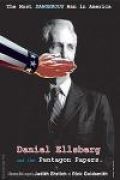
Directed by
Judith Ehrlich / Rick Goldsmith
94 minutes
Rated PG
Reviewed by
Bernard Hemingway

The Most Dangerous Man In America: Daniel Ellsberg And The Pentagon Papers
Synopsis: A documentary about Daniel Ellsberg, a one-time White House aide who during the Vietnam years transformed himself from gun-toting, party-line policy-maker to whistle-blowing peacenik.The years 1965-75 with their political and social upheavals have proven to be a rich field for American documentary makers. Following suit, Judith Ehrlich and Rick Goldsmith have taken a relatively dry subject and made it both a revealing historical document and a rewarding insight into human nature.
Overlapping with Errol Morris’s 2004 Oscar-winner, The Fog Of War, insofar as both deal intimately with US involvement in the Vietnam war, the title refers, somewhat hyperbolically, to Ellsberg’s status as a purported threat to national security. Once instrumental in formulating America's military strategy in South Vietnam, in revulsion against the war, he leaked top-secret Pentagon Papers detailing America’s long-standing covert involvement in the country. The appellation is rather ironic as it was an attempt by the political right to slur Ellsberg as un-American but since their vindictiveness led indirectly to the Nixon Administration's ultimate and long-overdue demise as a result of Watergate, for them it proved to be true. The Most Dangerous Man In America deserves commendation if only because it ensures that Ellsberg's contribution to the peace movement and, perhaps even more significantly, freedom of speech in America, will not be forgotten, or for many of us to whom he may be only a distantly-recognized name, acknowledged.
Besides being a detailed and gripping behind-the-scenes account of the actual chain of events, like last year's The Cove, the film is also the story of one man’s crisis of conscience and the life-changing decision he made to right the error of his ways. When at the film’s end we see Ellsberg, now in his 70s, being arrested for demonstrating against the Iraq war (presumably during the Bush years) it is both heartening and inspiring to know that he has remained true to his commitment. Even if after 40 years the core subject-matter of Ellsberg’s political conversion and his act of defiance do not seem so vital, his reflective voice-over and the comments of various associates, needless to say all thoughtful and articulate people, give this film a much broader value as a study of the power of ideology and the nature of human psychology, those often crudely powerful realities that underpin the deceptions and rationalizations of politics.

Want more about this film?


Want something different?




